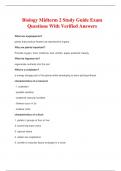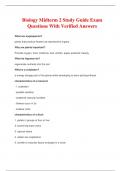Internodes - Study guides, Class notes & Summaries
Looking for the best study guides, study notes and summaries about Internodes? On this page you'll find 96 study documents about Internodes.
Page 2 out of 96 results
Sort by

-
Louisiana Horticulture Test Study Guide 2024 Graded A
- Exam (elaborations) • 5 pages • 2024
-
- $11.99
- + learn more
What is the difference between a cultivar and variety? - Cultivar- A plant or grouping of plants selected for desirable characteristics that can be maintained by propagation Variety- A naturally occurring subgroup of a species which has some distinguishing characters Who is Linnaeus? What system of naming plants did he create? - Linnaeus is a Swedish Botanist who developed the Binomial System of Nomenclature(Genus + Species) Why is it important to know common and scientific names of pla...

-
WSU BIO 106 Exam 1
- Exam (elaborations) • 8 pages • 2024
- Available in package deal
-
- $9.99
- + learn more
WSU BIO 106 Exam 1 The three basic plant organs, ________, are organized into_____________. - Leaves, Stems, Roots; A shoot system and a root system Nodes - The point at which leaves are attached Internodes - The stem segments between nodes Root - -An organ that anchors the plant into the ground -Absorbs minerals and water from the tip -Stores organic nutrients -Root hairs increase surface area and absorb most of the water and minerals Axillary Bud - A structure that has poten...

-
Bio 242 - Exam 2 Already Passed!!
- Exam (elaborations) • 11 pages • 2024
- Available in package deal
-
- $7.99
- + learn more
Monocot root system - Answer-Fibrous Eudicot root system - Answer-Taproot Mycorrhizae - Answer-Symbiotic relationship between plants and fungi (hyphae) - increase in surface area Nodes - Answer-Portion(s) of the stem where leaves attach Internodes - Answer-Segments of the stem where no leaves attach Terminal buds - Answer-Composed of developing leaves and are partly responsible for inhibiting the growth of axillary buds by apical dominance. Apical dominance - Answer-Plants grow verticall...

-
Biology Midterm 2 Study Guide Exam Questions With Verified Answers
- Exam (elaborations) • 8 pages • 2024
- Available in package deal
-
- $11.49
- + learn more
Biology Midterm 2 Study Guide Exam Questions With Verified Answers What are angiosperms? plants that produce flowers as reproductive organs Why are plants important? Provide oxygen, food, medicine, fuel, shelter, paper products, beauty What do legumes do? regenerate nutrients into the soil What is a cotyledon? a energy storage part of the plants while developing to learn photosynthesis characteristics of a monocot - 1 cotyledon - parallel variation - scattered vascular bundles - fl...

-
Biology Midterm 2 Study Guide Exam Questions With Verified Answers
- Exam (elaborations) • 8 pages • 2024
- Available in package deal
-
- $11.49
- + learn more
Biology Midterm 2 Study Guide Exam Questions With Verified Answers What are angiosperms? plants that produce flowers as reproductive organs Why are plants important? Provide oxygen, food, medicine, fuel, shelter, paper products, beauty What do legumes do? regenerate nutrients into the soil What is a cotyledon? a energy storage part of the plants while developing to learn photosynthesis characteristics of a monocot - 1 cotyledon - parallel variation - scattered vascular bundles - fl...

-
Biology Midterm 2 Study Guide Exam Questions With Verified Answers
- Exam (elaborations) • 8 pages • 2024
- Available in package deal
-
- $11.49
- + learn more
Biology Midterm 2 Study Guide Exam Questions With Verified Answers What are angiosperms? plants that produce flowers as reproductive organs Why are plants important? Provide oxygen, food, medicine, fuel, shelter, paper products, beauty What do legumes do? regenerate nutrients into the soil What is a cotyledon? a energy storage part of the plants while developing to learn photosynthesis characteristics of a monocot - 1 cotyledon - parallel variation - scattered vascular bundles - fl...

-
WSU Biology 106 Exam 1 | 2023 | 100 Questions with 100% Correct Answers | Updated & Verified
- Exam (elaborations) • 13 pages • 2023
- Available in package deal
-
- $15.49
- + learn more
Most species extinction can be traced to what four major threats? - Climate change, habitat destruction, over harvesting, and the introduction of species. Name three functions of the root? - Anchors the plant, absorbs minerals and water, and stores organic nutrients. What part of the root system is responsible for absorbing the majority of minerals and water? - The root hair. What two components create the stem? - Internodes and nodes. What are nodes? - The points where leaves attach to t...

-
CLEP Exam – Biology exam 2023 with 100% correct answers
- Exam (elaborations) • 13 pages • 2023
-
Available in package deal
-
- $17.49
- + learn more
Root, stem, leaf, flower, seed, fruit - correct answer Refer to Angiosperms picture downloaded in Desktop Roots - correct answer organ of plants that provide structure, absorb nutrients and water, and help protect against harmful external environments Stem - correct answer A vascular plant organ consisting of an alternating system of nodes and internodes that support the leaves and reproductive structures. Leaf - correct answer a flattened structure of a higher plant, typically green an...

-
KSU Bio 198 Exam 6 Practice Questions and Correct Answers
- Exam (elaborations) • 12 pages • 2024
-
Available in package deal
-
- $9.49
- + learn more
C4 The ______ photosynthetic pathway is where carbon dioxide is fixed by RUBISCO into sugars via the Calvin Cycle. It uses ATP, photorespiration is minimized, and it increases the rate of photosynthesis. C3 In the ______ photosynthetic pathway, carbon dioxide is fixed by RUBISCO into sugars via the Calvin Cycle (just like in C4). CAM The _____ photosynthetic pathway separates light-dependent reactions and uses carbon dioxide and the Calvin cycle temporarily. C3 The ______ photosynthetic pathw...

-
KSU Bio 198 Exam 6 Questions And Answers (Updated And Verified)
- Exam (elaborations) • 14 pages • 2024
-
- $11.09
- + learn more
KSU Bio 198 Exam 6 Questions And Answers (Updated And Verified) The ______ photosynthetic pathway is where carbon dioxide is fixed by RUBISCO into sugars via the Calvin Cycle. It uses ATP, photorespiration is minimized, and it increases the rate of photosynthesis. C4 In the ______ photosynthetic pathway, carbon dioxide is fixed by RUBISCO into sugars via the Calvin Cycle (just like in C4). C3 The _____ photosynthetic pathway separates light-dependent reactions and uses carbon dioxid...

Do you wonder why so many students wear nice clothes, have money to spare and enjoy tons of free time? Well, they sell on Stuvia! Imagine your study notes being downloaded a dozen times for $15 each. Every. Single. Day. Discover all about earning on Stuvia


